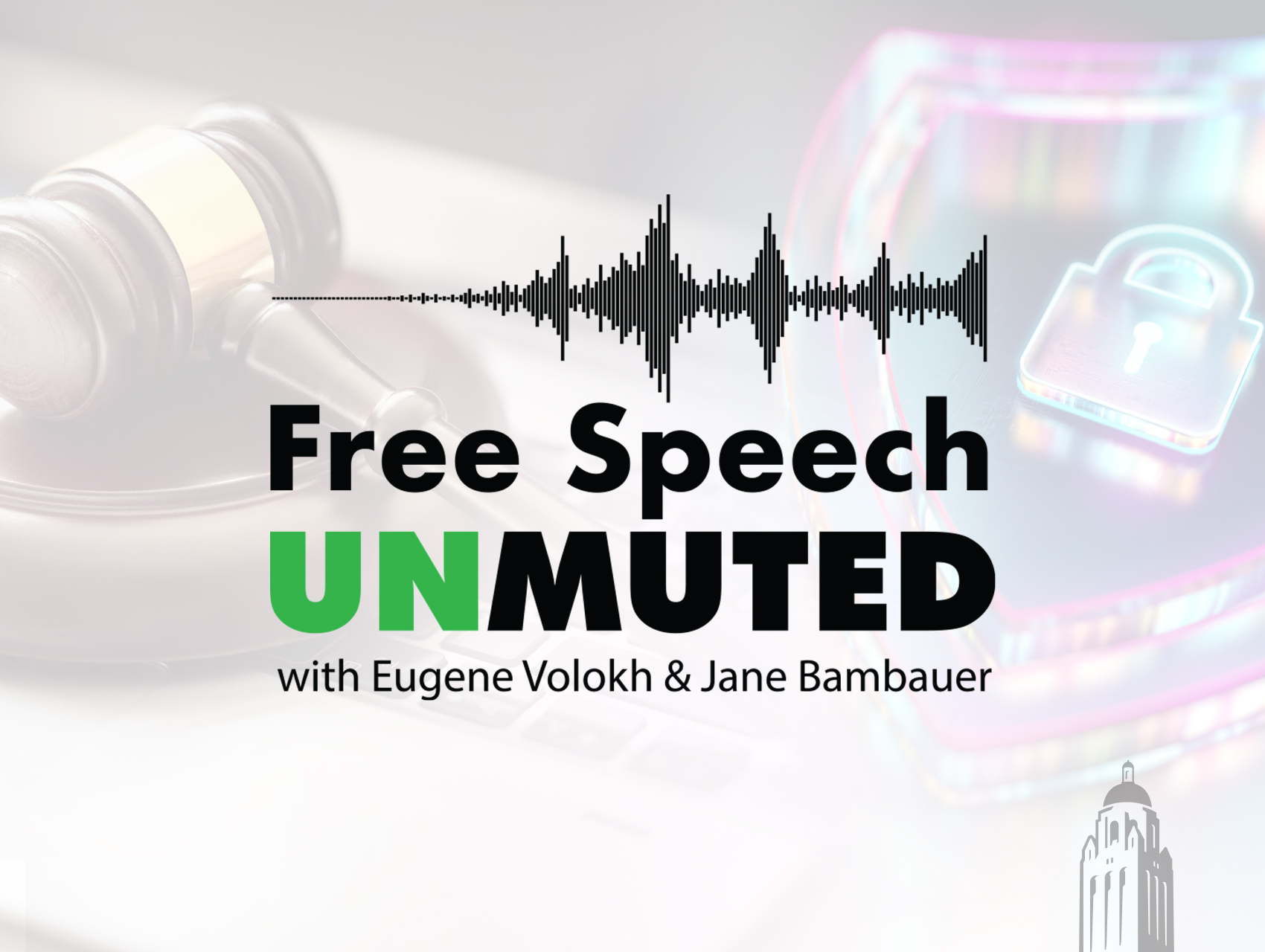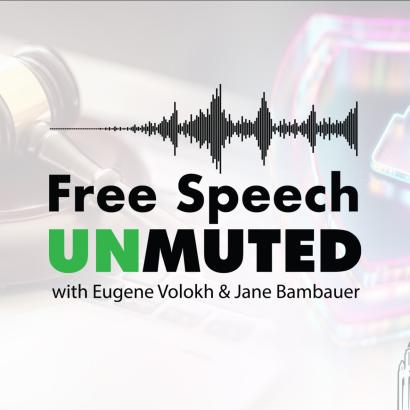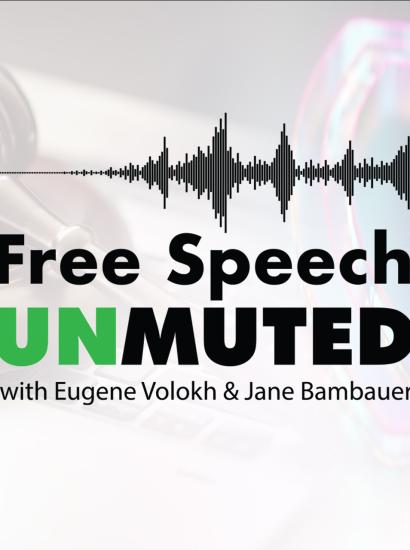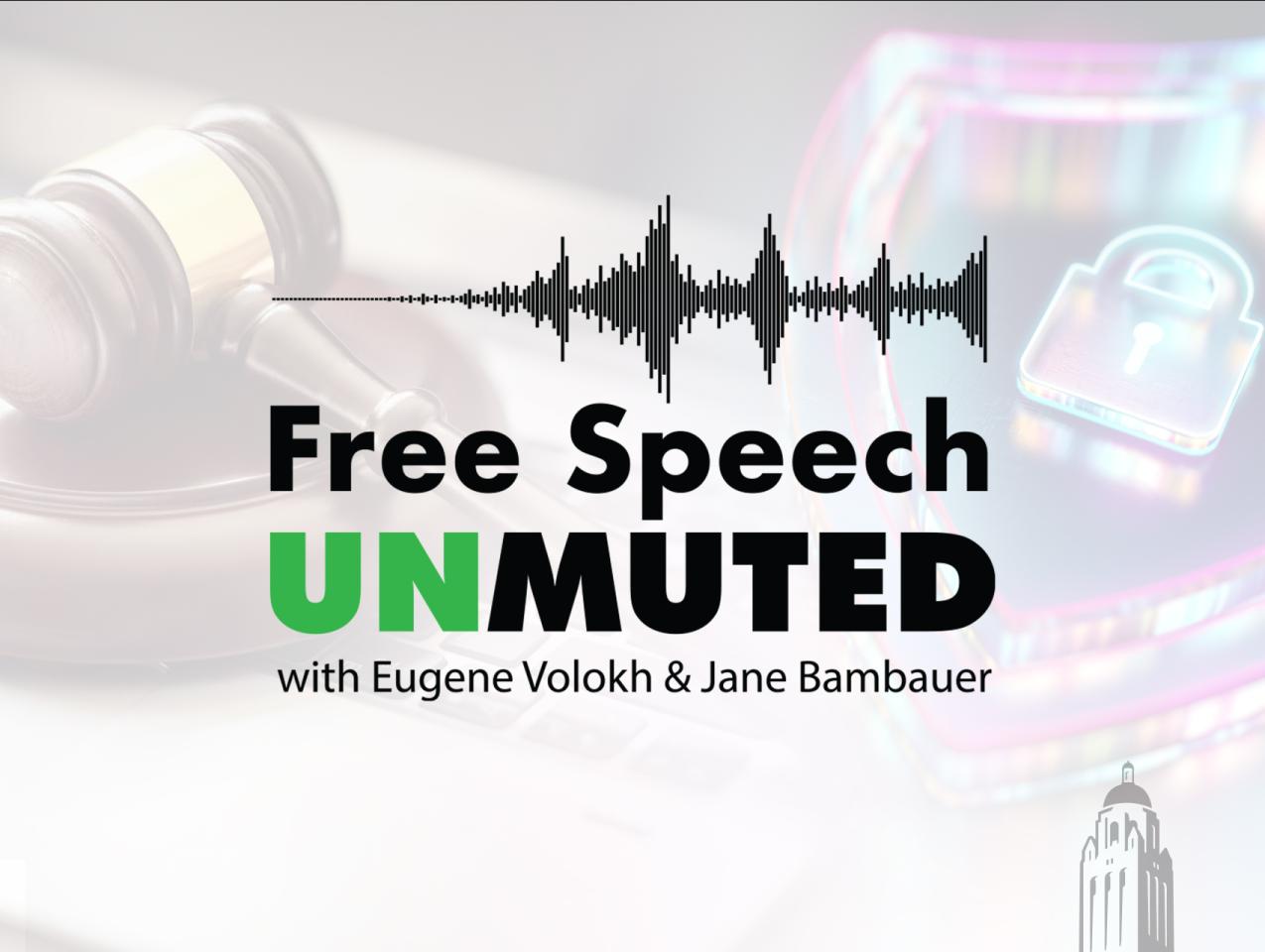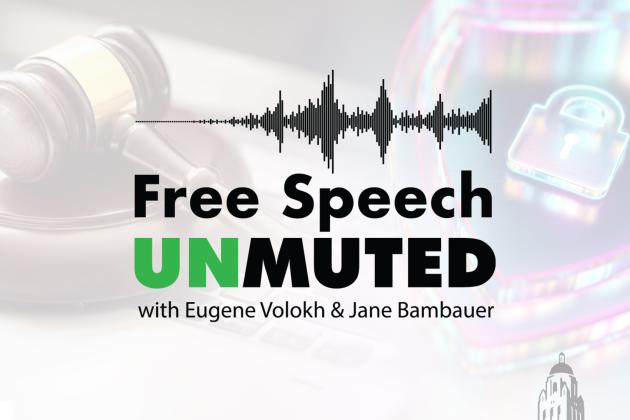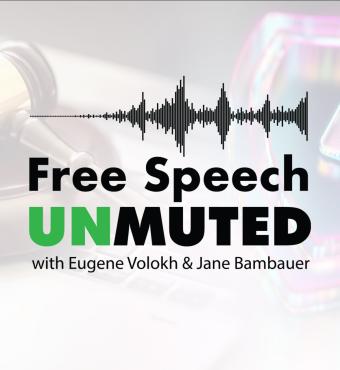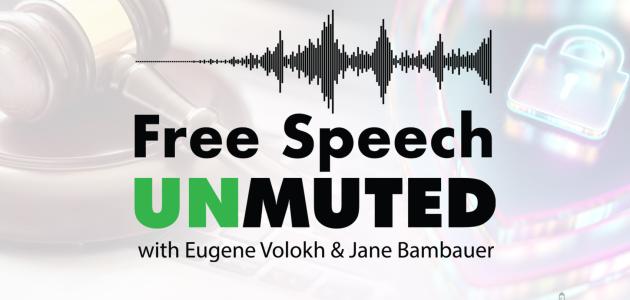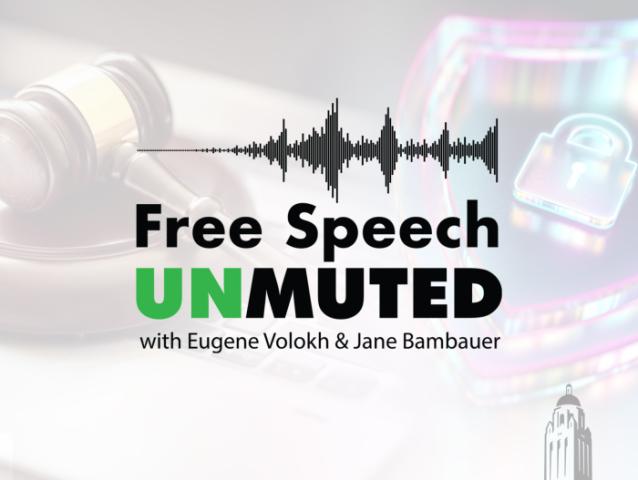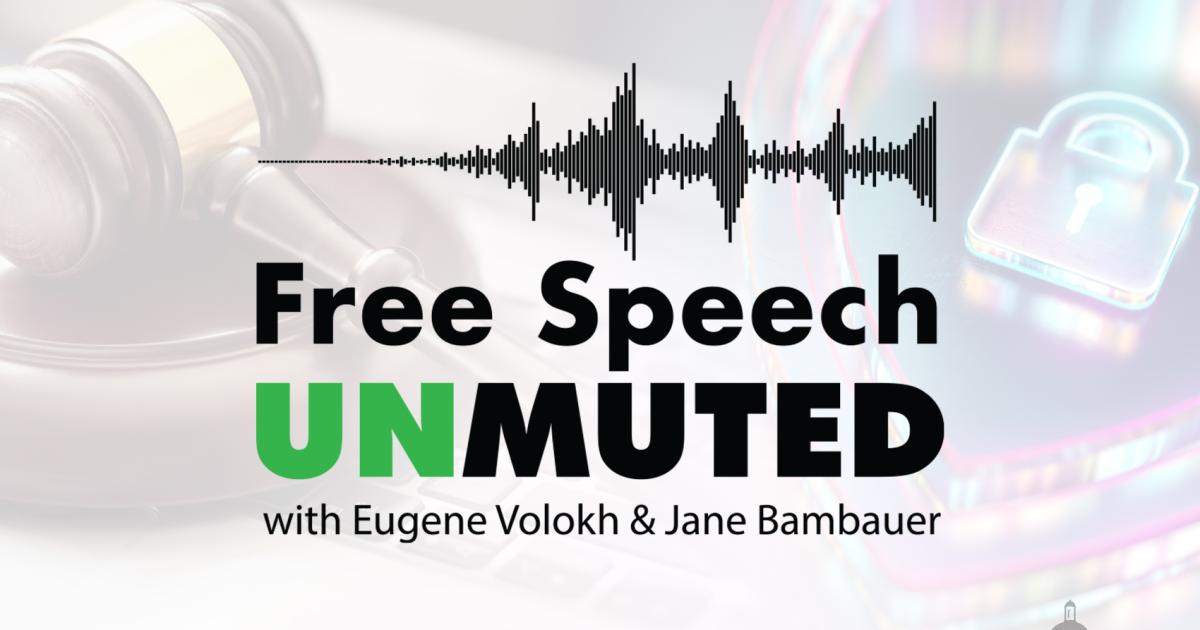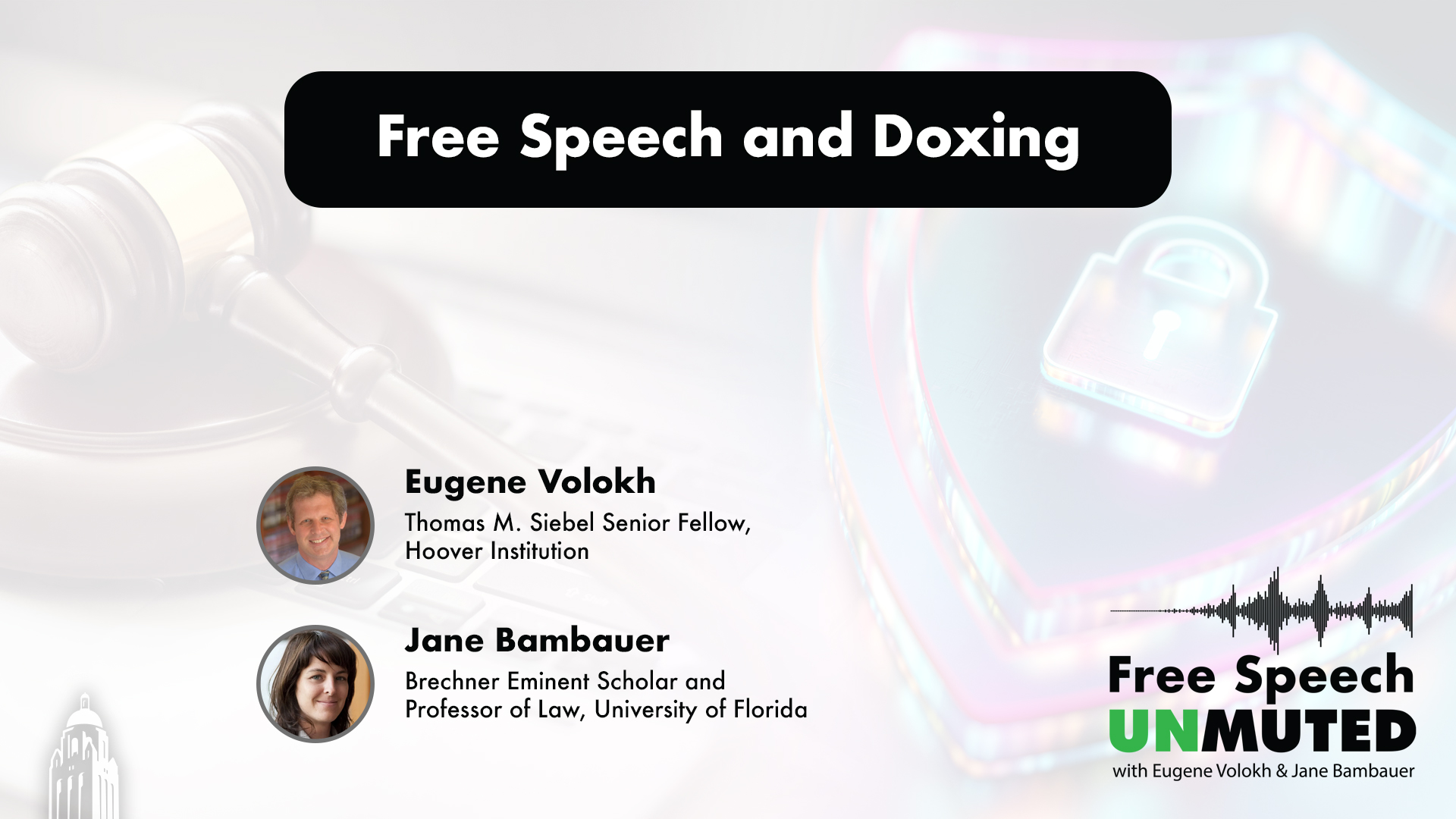- Law & Policy
- Revitalizing American Institutions
Eugene Volokh and Jane Bambauer dive into the debate about “doxing” — putting someone’s personal info out in public, usually to call them out or put pressure on them. They talk about how the term is defined (or not) in different laws, and how those laws bump up against the First Amendment. They also share real-life examples — from civil rights boycotts to the online outrage over the dentist who shot Cecil the Lion — and look at how exceptions like “true threats” or “incitement” fit in. The big case in this area is the recent Kratovil v. City of New Brunswick, where New Jersey’s highest court upheld “Daniel’s Law,” letting judges and police demand their home addresses not be published online (including by news sites). Eugene and Jane break down what that means for privacy and for free speech.
>> Eugene Volokh: Hello and welcome to Free Speech Unmuted. I'm here with my co host, Jane Bambauer from the University of Florida. I'm Eugene Volokh from the Hoover Institution at Stanford. I'm also an emeritus professor at UCLA Law School. Today we're going to talk about doxing. By the way, I should say it's doxing, in my view, with one X, not two X's, because that's English for you, right?
It's boxing, taxing out, foxing. I think it's with 1x, but different people take different views. Even I at times have written it with two X's. So there's no clarity on even how it's spelled, much less what exactly it is. As I understand it, back in the day, doxing was kind of a technical online term among people who participate in various online groups.
Comes from the word documents, and it was short for publishing documents about someone, usually identifying them, but often going into considerable detail, sometimes financial information, sometimes other information that provides a good deal of detail on that person, as many documents do. Increasingly, it has been used to refer to basically publicly identifying someone, especially in a context where you're identifying them and linking them to some supposedly bad behavior.
So I've heard it used, for example, for simply saying, this is the person who was depicted in this video doing something supposedly, or saying something supposedly racist. Or here are the names and photographs of people who are leaders of some student groups that expressed support for the October 7 attacks or didn't adequately condemn those attacks or something like that.
So there's no completely clear definition. There are statutes, some of which use the term doxing, but most don't. Different statutes in different states that forbid doxing sometimes make it a crime, sometimes make it civilly actionable, but they too differ quite a bit from each other and differ as to what is covered.
So, for example, some statutes include essentially publication of any information about a person, including their name, say, identifying information, the name, their photograph. Others require more specific details, like, for example, their home address or their personal phone number, or names of family members or employment information. Some of the statutes talk about financial account information or Social Security numbers and the like.
Now, as you might gather, especially if there's a broad statute that applies to publication of names, you gotta wonder, well, what about those massive doxing enterprises that we know as newspapers which publish all sorts of information, including people's names, in context where the people might much rather not be identified and might indeed publish it in ways that could lead to some attacks on the person, whether violent attacks or vandalism or threats or whatever else.
Say if a newspaper publishes that somebody has been accused of a serious crime, maybe a sex crime, maybe a sex crime against a minor, or maybe of defrauding the elderly or something else that might really lead to public condemnation, including possible criminal attacks. So the statutes actually have multiple dimensions you might think of.
One is what personal information is covered. Another is whose information is covered. Some of the statutes, for example, only apply to publication of things like addresses and phone numbers of government officials or certain kinds of government officials, maybe say police officers or legislators or judges, on the theory that they're especially vulnerable because they do things that a lot of people might want to retaliate against them for.
Another possible dimension is where should the information not be distributable? Some of them, for example, only apply to online publication, although others apply more broadly. Some may focus on social media. Another dimension is what purposes does the government have to prove on the part of the speaker in order to get a conviction, or the plaintiff has to prove in order to get liability?
So some of the statutes focus on publishing this information with the intent to intimidate someone, maybe kind of in a context where it is threatening. Others may focus on with the intent, the purpose of causing someone to commit a crime against the person. Others might say purpose to harass.
Although then the question is what does that term mean? And others may say, we don't care about the purposes. The important question is the effects. Although then again, the question is how do you keep them from outlawing publication of information by newspapers? Although as we'll see shortly, maybe some of these statutes do apply to publication of at least certain information by newspapers.
There are other dimensions that one can think about when designing the statute or just reading the statute and interpreting it. One, for example, might be whether people are barred from, say, publishing someone's name, period, or only required to take it down once the person demands that it be taken down.
Some statutes are basically written that way. So for example, a police officer can demand that his or her home address information be removed from. From. From some, maybe some database or some newspaper article or some website or whatever else. Newspaper, of course, online newspaper article where it can be removed.
And then finally one can ask, well, if there is going to be this prohibition, should it be criminal law? Should be civil liability? Should be. Civil liability may be enforceable through an injunction, because once the person gets an injunction, then violating it would be a crime. So that shows kind of the porousness of some of these borders.
Recall that the First Amendment applies to civil liability as well as to criminal liability. So if one of these statutes or some other cause of action, maybe common law cause of action is interpreted to prohibit certain kinds of publications, that too would raise a First Amendment issue. So that's the big picture.
Let me just give you folks some concrete examples of the kinds of things where this might arise. I mentioned one of them so called doxing trucks you drive around the neighborhood with names and photographs. I think those did not include home addresses of people who you say have done bad things.
And pretty clearly you're trying to mobilize public opinion against those people. Pretty clearly you're trying to get them socially ostracized, let's say maybe even professional fired from their jobs or whatever else. But there's the possibility that some people might go beyond that and might act criminally based on that, might physically attack them or vandalize their property or whatever else.
Maybe even that's the purpose of the truck owner. Although that's a hard thing to figure out for sure whether that's the purpose or not. Here's another example. Supreme Court case from way before the Internet or a 1982 NAACPV Claiborne hardware. The NAACPB In the 1960s, it took a long time to get the case resolved by the supreme court.
The late 1960s was organizing a boycott by black citizens of Claiborne county of white owned stores. The boycott was aimed at getting the white establishment of Claiborne county to change various policies. And some black citizens didn't wanna participate. So in order to. To pressure them into doing so, there were store watchers stationed outside the stores and they would take down the names of.
Of the of black shoppers. And then those names would be read out loud at meetings of the NAACP chapter at local black churches and were also distributed in mimeograph form. Unsurprisingly, there were some criminal attacks, a handful, but still some number of criminal attacks, some potentially quite serious on the people who weren't compl with a boycott.
Although the boycott organizers were saying, well, what we're really going after is social ostracism again. But it's. If you are organizing a social ostracism campaign, there's always the risk that some people who feel very strongly about it will go beyond that. The Supreme Court unanimously said that's constitutionally protected speech.
So it's an interesting question how that bears on things now though, that just included names and not addresses and such. But it's a small, was a small county and relatively small black community. So my guess is everybody knew where everybody else lived. Publicizing a person's name was sufficient to dox them in that respect.
So those are some examples. You can think of others as well. Remember, if you remember Cecil the Lion and the dentist who killed Cecil the Lion. He was hunting in Africa killed Cecil the Lion. There was this outrage. He was publicly identified. As a result, there were threats sent to him.
It interfered with his dental practice. But also there were apparently criminal threats, although my sense is no actual criminal violence against him. Would it be. Should it be illegal to publish the name of the den of that dentist and maybe the address of his practice and say send him letters or maybe.
How about his email address? What about his home address? What about just publishing the name in a context where everybody knows it's easy enough to find the person based on the name. If you know, for example, what address this practice is in because, of course, that's going to be a matter of public record.
Business addresses generally are. So there are lots of these kinds of examples. But I just want to lay out the big picture and then we'll talk more about the details. So Jane, that's my sense of the big picture. What's your sense of either the big picture or what you think the right way of thinking about these things should be.
>> Jane Bambauer: Yeah, I, too, like you, have always had trouble getting some precision over what it means to, to docs as opposed to public pressure or public accountability campaigns. I, I mean, I think, I think the, it's obvious that the, these are two sides of one coin, but it's also very obvious that people tend to flip the coin on one side when they don't really mind the public pressure and flip it to the other side when they do.
And so, so it's, it's hard to be, you know, completely politically neutral when looking at any one example. The other thing is, you know, we already have certain categories of unprotected speech that are relevant here. True threats. You've mentioned incitement and then harassment, which was, is a little bit, you know, it's, it's, it's not always included on the list of specific categories of unprotected speech.
But, but the definitions of those, especially true threats and incitement, they're quite narrow. And a lot of the, especially the new legislation that has cropped up for the last 10 years overlaps in some ways, but isn't, isn't, isn't entirely contained within those unprotected speech categories. Usually, I think, I think we can talk about a case that was recently decided in New Jersey to really sort of sink our teeth into this.
But, but, but as a result, it means that lawmakers are looking for some categories of disclosures of personal information that are kind of incitement, dish and kind of threatening, but don't fit either of those categories, but maybe has some other factors that could, in theory, stand up to some scrutiny.
But it seems to me that that's, it's, you know, I approach this problem somewhat skeptically partly because of the, because of how easy it is to have kind of, you know, political biases that wind up getting tapped into with these types of cases. But, but also because there's a lot of good reporting and information gathering and just, you know, the sort of information freedom that we generally want, even just simple things, some, you know, quality of life or ease of transactions and stuff where we don't want to encumber information too much without having really good reason.
So maybe we could talk about some of the recent legislation and cases and see whether it's doing something useful and solving some problem that true threats doesn't. Because, you know, what I worry about is that what's really happening is we're sort of putting another layer on top of true threats.
It's like, well, now this information's out there, and so some people are making threats or there's at least the risk of threats and the risk of violence. And we're getting a little further, a little too far from the core theory of a malicious intent paired with a realistic risk of harm.
>> Eugene Volokh: So you're absolutely right that there are exceptions to the First Amendment protection, and some of them may be in play in some doxing scenario. But you're also right that as a general matter, they're quite narrow and probably not broad enough to cover what many people think of as doxing.
So let's start with true threats.
>> Jane Bambauer: Yeah, and actually, before we do for a second, or maybe we will get there, I think there's a really good example of incitement that is a form of doxing, and yet we can also understand how it's incitement. That was the website that published the names of doctors that performed abortions with sort of targets or gun imagery or something, which at least one court thought was not just providing, you know, not just a website that happened to provide the home details of these doctors, but was purposefully encouraging readers to go ahead and take matters into their own hands.
So that might be a useful, you know, example of a form of doxing that also fits comfortably within the incitement category.
>> Eugene Volokh: Right, so let's walk through some of these exceptions. One is for true threats. Generally speaking, true threats involves somebody saying essentially expressly or with a pretty very strong implication, I'm going to commit a crime against you, or maybe my buddies will commit a crime against you, and that is, generally speaking, punishable.
So long as in context, that's understood as a true threat rather than just hyperbole. And so long as the person is aware, at least of the risk that it's going to be interpreted as such a threat. But not everything that is threatening in the general sense is covered.
So for example, somebody might say, well, this newspaper published this article against me. I feel threatened by it because now I know all these people know of these accusations against me. Again, let's say it accuses me of, of fraud or of child molestation or whatever else. In fact, I'm already beginning to get death threats or vandalism or whatever else.
I feel threatened by it. Well, the newspaper article isn't going to fit in with the truth threats exception simply because it causes someone to possibly do something bad or increases the risk of that. In part because again, the newspaper isn't saying we're going to do this, we're going to commit crimes against you rather than just publicizing information that may lead others to commit crime against crimes against you.
And again, there's nothing special about it being a newspaper. Same with a tweet storm which condemns someone for supposedly racist behavior or for killing a lion or whatever else. So what about incitement? Well, so the incitement exception applies to speech that has the purpose to and is likely to cause imminent criminal conduct against a person.
So if I were to stand outside someone's home and talk to a mob and say, you know, we should burn down the house or even you should burn down the house so it's not a threat, I'm not going to do it. You should do it. That might be punishable incitement, but generally speaking, it does require a purpose of, of ca.
Of causing someone to commit. To commit a crime. And it has also this imminence requirement, it has to be basically right away. Now there's another exception which hasn't gotten as much attention as it should, but it's there. Supreme Court recognized it most just a few years ago, but before that, maybe about 15 years ago, two cases, Williams and Hanson, for so called solicitation of crime.
What's solicitation? Well, incitement usually deals with abstract advocacy. Solicitation involves calling for a specific criminal act, especially against a specific person, or involving a specific item of contraband or some such. So it seems pretty likely that if I were to say here's a kill list of all the people you my friends online should kill or should beat up, or whose property you should vandalize or whatever else, even though it's not calling for imminent illegal conduct, you should do it at some point, maybe even don't do it right away plan, because that's what's going to make it effective.
Well, that's still going to be probably punishable solicitation? I think the cases are not. There aren't a lot of cases on the subject, but there are enough to make me think that this is going to be punishable solicitation. So it doesn't have an imminence requirement, but it does have a specificity requirement.
So I do think that if somebody were to publish the names of people with a call for people to commit a crime against them, that might be punishable solicitation. But a lot of these situations don't involve that. Like the doxing trucks, for example. You could say, well, they're really trying to gin up violence against the leaders of these pro Palestinian, anti Israel groups.
But that's probably just speculation. Of course, it's human nature to assume that one's political adversaries have bad motivations and one's friends have good motivations, but objectively it seems pretty likely that what they're trying to do is gin up outrage against these people. But that's generally protected. And so it wouldn't be solicitation simply because there's a possibility that someone might commit a crime.
What about harassment? Well, harassment is a term that is even less well defined than doxing. And sometimes it's just not defined at all. Sometimes it's defined in fairly broad ways or fairly vague ways. Generally speaking, courts have said, including a 3rd Circuit decision written by then Judge Samuel Alito, now Supreme Court justice, that there is no harassment exception to the First Amendment, although a few other courts have basically acted as if there were without really clearly defining it unfortunately.
The California civil doxing statute does prohibit punishing, excuse me, does prohibit publishing certain information about people. And it has various requirements, but one of the elements is for the purpose of imminently causing harassment by a third party. And harassment talks about knowing and willful conduct directed a specific person that a reasonable person would consider seriously alarming, annoying, tormenting or terrorizing, and serves no legitimate purpose.
Well, if it's terrorizing- Right, the word annoying caught my ear. But seriously annoying, certainly.
>> Jane Bambauer: Seriously annoying.
>> Eugene Volokh: Certainly the dentist was seriously annoyed by all the attention he was getting. That was probably the intention of people who criticized him.
>> Jane Bambauer: Correct.
>> Eugene Volokh: That can't be enough. Now, what about the no legitimate purpose requirement?
That also seems odd, especially when applied to speech. How do we decide whether criticism of people who aren't complying with the civil rights boycott or of supporters of Palestinians or supporters of Israel or supporters of Hamas or criticism of dentists who go hunting for lions, is that a legitimate purpose?
Or not, do we want to put this in kind of the judges or the jury's hands deciding which purposes for this kind of advocacy are legitimate. So the exceptions are probably not broad enough by themselves to justify a lot of these doxing statutes. Maybe some of the narrowest ones can be justified under these exceptions, but not some of the broader ones.
So then the question is, should there be, should the court recognize some exception? I use exception loosely, but basically some First Amendment exception for certain kinds of personal information about people, like their home addresses, like their home phone numbers, and if so, why? Where do we draw the line?
What about their employer information? Sometimes it may be relevant that your political enemy is employed by someone. What about information about where their children go to college? So that's the really interesting question that I see lurking here. And that's the issue, by the way, that was recently resolved by the New Jersey Supreme Court, at least resolved in New Jersey.
Query whether other courts will agree. We'll talk about that in a moment. But Jane, tell me what you think about all this.
>> Jane Bambauer: Yeah. Well, actually, maybe we should just go ahead and jump into the New Jersey case. I was going to say there are, there are doxing adjacent laws that the Supreme Court has, has, has passed judgment on, including the Florida Star case.
But that comes up, it's the main case that the New Jersey court has to kind of avoid. So, so let's go ahead and get the, the facts of, of, of the facts that the New Jersey Supreme Court just ended without.
>> Eugene Volokh: Sure. So the case was just decided a month and a half ago.
It's called Crateville versus City of New Brunswick, New Jersey. So the New Jersey legislature enacted a law called Daniel Daniels Law, excuse me, after the child of a federal judge in New Jersey who was murdered at his home because of the murderer was disgruntled about some decisions on the judge's part.
So legislature enacts Daniels Law, which is aimed at, quote, enhancing the safety and security of certain public officials in the justice system, close quote. Those public officials basically are judges and law enforcement officers and maybe a few others. And what they do is. Excuse me, what the law does is it says that when such a public official, it demands that someone who has published or is about to publish their.
Their home address and home or home telephone number, that that person stop that that person take it down or not publish it. That has the force of law. So it's not a categorical ban on publishing people's home phone numbers and telephone numbers, not even a categorical ban on publishing police officers or judges home telephone numbers and home addresses.
But it is a requirement that if they demand that this information not be published, that indeed did not be published. So Charles Craddeville is a local journalist, and he was writing about a local police chief of a small town and concluded that this police chief actually lived quite far away from the town.
And that made it harder for the chief to perform his duties, made him unsuitable for his job. Plausible kind of argument, although you can agree or disagree with it and credible says in order to be able to make this argument, I need to be able to include. To indicate where this person lives.
Because otherwise people say, well, you say he lives far away. How do we know that you're telling the truth? And I could say, well, trust me on this. But, you know, a lot of journalists figure if that saying trust me is a good way of getting people not to trust them, and that the trick is to show what, I guess kids these days call show the receipts, to actually show the underlying data, maybe a voter registration form or something like that.
So he sued to challenge the application of the law, and the New Jersey supreme court upheld that, the law, and it said that. That it is permissible for the legislature to. To restrict the publication of this kind of information, at least about these kinds of government officials. Certainly not all information, certainly not names and photographs and such, but at least this kind of information, because that information makes it easier to commit for people to commit crimes against the targets.
Now, as you point out, there was an important case called Florida star VBJF back in the late 1980s, which in which involved a state law that banned the publication of the names of rape victims. And the supreme court struck down that law, and it said, you Know, newspapers have to be free to publish this information, at least when they get it from public records, as opposed to from maybe an illegal leak or something like that.
And many thought that that really meant that at least news organs probably means pretty much anybody who wants to talk about public affairs can publish information about people, including highly private information, such as the fact that this person had been raped.
>> Jane Bambauer: And by the way, the Supreme Court even made a point to clarify that, yes, of course, reporting on the incidence of a rape is a matter of public concern, but even the name of the rape victim.
>> Eugene Volokh: Exactly.
>> Jane Bambauer: Is a matter of public concern, largely for the reasons that, Eugene, you were just saying that for the credibility and sort of good news practice, separating the precise facts from the overall story, that the court just wasn't willing to allow the state to demand that kind of separation.
>> Eugene Volokh: Right. So the New Jersey Supreme Court said, for various reasons which probably needn't go into the precise details, say, well, that's different. This law is considerably narrower and therefore constitutional, though the consequence is this means that in America it's a crime to publish accurate information about public officials.
In fact, this law is only about public officials.
>> Jane Bambauer: Well, that's-
>> Eugene Volokh: Not a crime to do it about private people.
>> Jane Bambauer: So, yeah, in that sense, the narrowness of the law, I thought would have caused a constitutional problem in itself because if the concern that motivated the lawmakers is the category of people who will predictably be the victim, the targets of violence and retaliation, for sure, judges and police officers oftentimes are going to be on that list, although maybe not every time.
I mean, I could imagine some divisions within the judiciary, for example, where this doesn't come up much. But also there are many other people for whom doxing could probably be equally, if not more foreseeably threatening. And so. So the court's, you know, application of strict scrutiny, I thought was.
It sort of surprised me. Did you find it surprising?
>> Eugene Volokh: Yes, I did. I mean, I could certainly understand why courts feel something needs to be done about this. And so, you know, judges are humans, and it's a human, normal human reaction to protect people from. From. From the kinds of attacks that can be facilitated by the publication of home addresses and phone numbers.
>> Jane Bambauer: I mean, especially, yeah, especially when there's an impression that there's a growing threat to which the court said there is, and I know that the US Marshal Service sort of submitted an amicus brief claiming to have data showing that. I still wondered, though, the court kind of combined threats of violence and violence.
And I have no doubt that threats of violence have become more common in the Internet era. I remain a little bit skeptical, especially given that the denominator in terms of the numbers of judges and law enforcement officers and whatnot has grown over time. I'd be a little skeptical that the actual incidence of violence has, has, has actually grown, but.
>> Eugene Volokh: Right.
>> Jane Bambauer: But okay. But.
>> Eugene Volokh: Yeah, it's hard. It's hard to know for sure. There certainly is a risk of such violence. Thankfully, it happens fairly rarely, especially at people's homes, but there is this risk. So basically the New Jersey Supreme Court's view is, look, this is speech that is potentially quite harmful.
It also, the court took the view it doesn't have that much constitutional value. Yes, there's this theory about how it's necessary in order to provide really concrete evidence that this person lives elsewhere. But you know, even here you could just say it. And expect people to trust you or maybe maybe offer to, or not offer to, but suggest that if that people could find it in public records, if that's where you found it, and in most situations it wouldn't even be useful for the kind of journalism that you're engaging in.
There's really relatively little lost through this kind of restriction and much potentially to be gained. I think that's one of the things the justices, New Jersey Supreme Court justices were thinking about not saying they were right, but I think that's the kind of thinking they were going through.
Now I take it there's going to be a petition for review by the US Supreme Court. There's no so called split among lower appellate courts. Clear disagreement with some courts going one way and other courts going another way. That's the kind of thing that usually brings Supreme Court review.
But it's possible that the U.S. supreme Court will say, look, it's momentous enough thing that state Supreme Court has upheld the law criminalizing certain kinds of media publications that we ought to really look at it. But they may also just say let's let it percolate as the term that Supreme Court people, Supreme Court lawyers sometimes talk about, use talk about.
Some justices have as well. Let's see more lower courts consider it. I should say I've seen a few other lower court decisions which pretty offhandedly issued even injunctions barring the publication of someone's home addresses. I've seen, depending how you counted, three or four lower federal court decisions, three district court decisions, and maybe a federal circuit court decision, although it focused on slightly different matters that have struck down attempts to restrict doxxing.
They didn't use the term at the time. And the three district court decisions actually involved the publication of home addresses, including of government officials. I was actually one of the lawyers for the challenger in one of those cases. So different judges have had different views on the subject.
But obviously New Jersey Supreme Court being an appellate court and not just a trial court potentially is going to be quite influential on this. Let me add one other twist, by the way, which is specific to home addresses. So in most states and cities in the country, it's legal to picket outside someone's home.
In fact target that person's home for picketing. The Supreme Court in the late 80s has said that content neutral bans on residential picketing are constitutionally permissible. But most states have do not implement such bans. New Jersey, for example, does not implement such bans. So if it's legal and it's legal protest Activity to engage in residential picketing outside someone's home.
Can it be that the law can ban the publication of the home address? If so, how do you organize the protest, right? What's more, the Supreme Court's decision upholding the residential picketing ban, Frisbee v. Schultz is the name of that case, actually specifically said. One of the reasons that this is constitutional is because it leaves open ample alternative channels, such as marching past the house.
That will be a protest that sort of indicates your disapproval of the occupant without being kind of you or there for hours on end right outside the person's home. Well, so, so throughout the country, presumably under Frisbee v. Schultz, you have a First Amendment right to march past someone's house.
Again, how can you know to do that if you can't figure out the. The address? How can you say, we're going to be having let again assume it's lawful targeted picketing because it's not illegal in the state outside this person's home. Come here. Well, we can't tell you where to come.
I mean, I suppose we could say, well, we can tell you to come to this nearby parking lot and then we'll march. But what if you show up late, right? So one possibility might be that, you know, maybe we should revisit residential picketing and maybe it should be made illegal everywhere.
That I'm not a big fan of residential picketing. I don't think that these things should be brought to people's homes in part because of the risk of violence.
>> Jane Bambauer: Yes. I mean, there's even arguments now-
>> Eugene Volokh: In most states it is legal.
>> Jane Bambauer: Right. And, but, but also I think you're, you're pointing out a good tension because the, the picketing itself is itself kind of a disclosure of where someone lives.
>> Eugene Volokh: Exactly.
>> Jane Bambauer: You could, you know, even, even apart from the, the fact that sharing the address is a necessary precondition to organizing the picket, the picket is then its own subsequent disclosure as well, redisclosure as well. So, you know, basically the signs will say this judge lives here to anyone who happen driving by and didn't otherwise know that, you know, the, the other, the other Supreme Court precedent that I was thinking about are the cases, or actually I should say lower court precedent, are the cases that have to do with the 14th amendment right to privacy when governments would otherwise compel the disclosure of personal information.
So the Supreme Court case is not really on point. It was, it's another NAACP case, the one against Alabama. But the lower courts, in kind of trying to understand how to apply that case, which involves kind of malicious. Alabama trying to maliciously require the disclosure of NAACP's membership lists.
That Supreme Court was really concerned about the right of association. But other courts have understood that the reason privacy of that sort is so important is that some of these disclosures will predictably lead to violence, but they really, really narrow their application of that right to privacy, of the constitutional right to privacy, to cases where there is a specific, you know, that there's a specific reason to think that this specific target or his family are going to be put at risk.
So another way in which I thought the New Jersey law didn't seem particularly well tailored as a, you know, as compared to things that courts have said in the past about the appropriate limitation on, on otherwise kind of, you know, access to, to information is, is that it seemed that as long as you're a police officer, you can, you can provide that notice.
And Daniel's Law sort of kicks in. There aren't. I could imagine there being other requirements to be shown, but none of them were baked into the law.
>> Eugene Volokh: Yeah. So there is a right of privacy against the government that, that bars the government from demanding that people turn over certain information, like for example, the membership of their political groups.
It's an interesting question to what extent are some of such mandates which have been upheld despite that, to what extent they promote doxing. So, for example, the Supreme Court has said, well, you. The state can require, federal government can require that contributors to political campaigns being publicly identified, enlisted.
Well, that makes it, that makes it easier for other people to then come up with. With doxing lists. Back, I think some couple of decades ago when there was this proposition 8 Anti same sex marriage campaign in California, people would come up with these maps basically integrating the lists of donors to the anti same sex marriage campaign.
And with the address information that they could get from public sources and this map will sort of show here's where the anti same sex marriage people around you live. And again that could be a powerful tool for social pressure, could also be potentially a tool for attacking people or vandalizing their homes or making people feel threatened.
With regard to that you could say, well the government just should be releasing a lot less such information including say home address information. Interestingly in America, generally speaking, I can't speak for every state in every way, but generally speaking, home address information has been a matter of public record in many states.
It's part of voter registration records and is made publicly available. It's also part of property tax records. Now you can you, if you buy your home through a trust or something, through some shell corporation or shel company, you can avoid that or through some trust. But a lot of people don't think about that when they, when they buy their homes.
So, so maybe we should, if we really care about these things, we should, we should restructure that. But you know that would take a lot of restructuring in, in a lot of different jurisdictions throughout the country. So. So in any event, I think this is an issue that is not going away by any means unless maybe the Supreme Court steps in and says something authoritative.
But A, I'm not sure the Supreme Court will step in here in the Cradleville case and B, when it does step in, it often doesn't say anything super authoritative. Rather it says something to resolve the case but leaves a lot open. I should say I am a reporter.
This is a technical name for the Uniform Law Commission study group related to doxxing. Uniform Law Commission is a commission that generally aims at proposing state laws on subjects where there's good reason to have uniformity among the states, but where the states would rather do things themselves rather than having Congress somehow preempt the whole thing.
So we've been talking about whether the Uniform Law Commission should recommend a doxing statute and it's been very interesting and in some respects enlightening to see people's reaction maybe in darkening because this is one of those subjects. The more you think about the harder it, the harder it ends up being I think.
So there certainly has been legislative action, not a lot of state court decisions challenging that. Again, Cradleville is the only one that's come up to the state supreme court level. I don't even know of any state intermediate appellate cases that have really focused hard on that. Maybe a few have talked tangentially about some of these laws and very Few even state trial court cases.
I've seen it starting to bubble up, but we're still in early days, I think in the courts and in the legislature's exploration of this issue.
>> Jane Bambauer: Yeah, I mean, I do worry though that the, the incentives for someone, even a reporter to fight this rather than just leaving out the, you know, address or whatever, you know, the information that's covered by the statute might be somewhat low.
This is the, you know, this is the public goods problem of, of news reporting and information more generally. But, but yeah, hopefully, you know, the, I guess will by the time the Supreme Court, the, you know, by the time there's litigation that brings a lot of facts to, to lots of different courts and by the time the Supreme Court gets to think through it, maybe we'll have more information about the trade offs between transparency and privacy.
>> Eugene Volokh: Yeah, so I totally appreciate your point that a lot of speech restrictions end up remaining on the books even if there's a real reason to think that they're unconstitutional. Because for a lot of speakers, they don't want us to spend tens of thousands of dollars or hundreds of thousands or more and a lot of time and effort or risk criminal prosecution in order to vindicate some abstract principles.
This having been said, I think especially these days, there are lots of free speech advocacy groups out there that may very well be willing to fight these cases. I think in part because of the Internet, it's a lot easier for them to organize these kinds of challenges for people to reach out to them and for them to reach out to prospective challengers.
Cradleville was represented by the ACLU of New Jersey. Of course, ACLU does not have unlimited resources and unlimited time to fight free speech cases. But it's the kind of thing that especially when there's a case that might set a statewide precedent that ACLU might be quite willing to deal with.
Foundation for Individual Rights and Expression is a relatively new entrant to the scene. It's been around for some 20 plus years as to campus speech, but only about three, four years ago did they start generally challenging speech restrictions more broadly. But they're I think do very high quality work.
I should say they represent me in some of the challenges that I've brought to free speech, to speech restrictions. And I've also supported, I've represented them sometimes in some friend of the court briefs. But in any case they're good and they're big and they're willing to challenge these things.
And there are various other such groups as well, whether media groups like Reporters, Committee for Freedom of the Press or others. So I do think that some of these laws, especially the broader ones, are going to be challenged. And the interesting question is how judges are going to react to them.
>> Jane Bambauer: All right. Very good.
>> Eugene Volokh: All right. Always a great pleasure, Jane, talking about these things with you. Great pleasure. People in the audience talking about these things where you folks can listen and look forward to talking to all of you again. Probably a few more weeks.
>> Jane Bambauer: See you next time.
>> Eugene Volokh: See you next time.
>> Speaker 3: This podcast is a production of the Hoover Institution, where we generate and promote ideas, advancing freedom. For more information about our work, to hear more of our podcasts, or view our video content, please visit hoover.org.







